Recently, I was honored to address the class of 2010 at Thomas College and receive an honorary Doctorate of Humane Letters. I hope I was able to inspire students to see their world as a garden and carry this metaphor with them as they go out and make a difference.

Delivering the commencement address. Photo: Katie Greenlaw.
I first learned about Thomas College last November when I came to speak there at A Day of Design, an annual event organized by Dr. Fran Day, Vice President for Institutional Advancement. While I got to walk the campus and meet some staff and faculty, the students were off on break. So this time I asked Fran to introduce me to a few young people here to get a sense of what the college has meant to them. While I was there, I met with three wonderful students. We talked about their hopes and ambitions after graduation, and recalled their best memories of Thomas. What stood out was the connection each student felt to Thomas, due in large part to the close-knit community and the close bonds formed with their teachers and classmates. Students and faculty had learned and grown together, and now, although they were about to part ways, they would continue to carry their experience at Thomas with them as they moved forward in their lives.

Bagpiper Herb Wilson and the commencement audience. Photo: Katie Greenlaw.
In my commencement address, which was one of the most difficult things I’ve ever had to write, I encouraged graduates to reflect not only on their time at Thomas but also on the collection of meaningful places and spaces that make up their lives. Here’s an abridged version of what I told the graduates:
“…I asked [one student] to describe what being at this college has meant to him. He said that the evening before, he opened his door at the Villages [a residence hall] and sat there, feeling how peaceful and quiet it was. He thought through his four years at Thomas, remembering how he had been and felt when he entered, and how much he’s grown and changed since. He said that felt sad to be leaving this place that has meant so much to him. It was an emotional moment, and I was touched and moved by his words.
It’s just such moments that I try to create in the gardens I’ve been designing for the past thirty-five years.
For me, gardens are much more than just pretty planted places: they are spaces, both real and imagined, of beauty and meaning. And each of us ‘collects’ such meaningful spatial experiences throughout our lives, from earliest childhood on.
Let me give you an example from your own life: Think back to your childhood daydreaming place—the place you went as a child for daydreaming, reverie, and reflection. I bet many of you thought of crouching under a forsythia or a rhododendron bush—seeing, but not being seen. Some of you remembered climbing high into treetops or lying on your back looking up at clouds in the sky. All of these were places of comfort, of beauty, and meaning for you in your world of childhood imaginings. I asked you to do this exercise because these daydreaming places from childhood were your first ‘gardens.’ And already, for Thomas and all you other graduates today, this college is another “garden” in your life. I know you will have many more to come…

Thomas College seal and campus. Photo: Thomas College.
So now comes the advice part of my speech. I have pretty much one piece of advice to give you graduates: See your world as a garden. That’s right: See your world as a garden.
If you do this, you’ll find beauty, joy, and inspiration wherever you go, even in things that seem negative at the time. Thomas yesterday brought up an incident in which he received a low grade on a paper because he hadn’t understood how to use a new system that was put in place here. Thanks to a good attitude and a great teacher, he was able to rework the paper and improve his grade. He saw this as one of the best learning experiences he had at Thomas because he learned so much about himself and became a better writer in the process.
This is what I mean by seeing the world as a garden; finding the goodness in whatever comes our way. If you see the world this way, the ugliest place becomes a thing of beauty; the most difficult moments hold seeds of joy—the world as it really is becomes more bearable by seeing it as a garden.
We often hear it said another way: ‘Get out and smell the roses.’ This suggests that you should take time to appreciate—everyday things, people, and events in your life. You can either complain that the rose bush has thorns or you can appreciate that the thornbush has roses!
Another garden metaphor: ‘Reap what you Sow’ suggests that whatever effort you put in to something will reward you in the end. The Shaker hymn, ‘Inch by inch, row by row, gonna make this garden grow’ tells you to take things one day at a time.
While staying true to your heart, you also need to use your hands—get them dirty once in a while by plunging them into the earth. We sit too much behind screens these days and the antidote is and always will be, getting back to nature. In other words: Get out! However you like to be outside, whether biking or hiking; swimming or gliding, make sure to get outside into nature every day.
And take time to steward this garden called Mother Earth that we all inhabit together…”

Conrad, Julie, and Todd. Photo: Steve Jonas.
Following my address, I was awarded an honorary Doctorate of Humane Letters by Thomas College President George Spann. I was also privileged to meet with Board of Trustees co-chairs Conrad Ayotte and Todd Smith, who gave me further insight into Thomas’s future as it continues to extend opportunities for higher education to its students.
More about Thomas College:
The Thomas College viewbook highlights what Thomas has to offer its students: Set on 120 acres in Waterville, Maine, the college provides a close-knit, supportive environment (average class size is 17 with a 15:1 student:faculty ratio) that prepares its students for entry into the real world. Thomas students benefit from a Guaranteed Job Placement Program, which promises each student a job in their chosen field of study within 6 months of graduation. 95% of graduates are placed in a job in their field within just 90 days of completing their degree.
Thomas believes that every student is entitled to pursue higher education; more than 67% of students are the first in their family to attend college, and Thomas offers 94% of its students some form of financial aid to support their educational goals. The college is also committed to keeping its graduates in Maine to contribute to the economic and cultural life of the state: more than 87% of students who graduated in the last 10 years currently live and work in Maine.

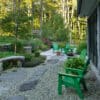
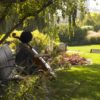
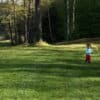
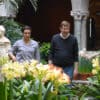
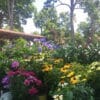
Affirmation of what drives our spirits in gardening, design and horticulture! Beautifully said, hopefully filling their hearts and creating a strong memory-moment for those graduates!
Julie, In this best of all possible addresses, you didn’t mention Votaire’s Candide? “Il faut cultiver notre jardin….”
Won’t it be nice when they discover how much other’s who’ve gone before them have cultivated the garden of Thomas, and the larger world. And that that they too will work to make it meaningful and whole.
Julie, your advice to “see your world as a garden” is literally life-changing. Thanks!
Thanks for the rose reminder. Every thorn on the stem is a message of hope that the rose will soon appear.